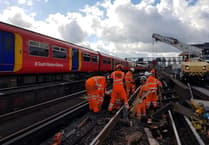Three days of strike action on South Western Railway (SWR) starting this weekend has been suspended, says the RMT union.
The strike had been planned for Saturday, November 5, Monday, November 7, and Wednesday, November 9 in a long-running dispute over pay and conditions.
The RMT, which represents rail workers, said it would now enter “a period of intensive negotiations” with Network Rail and the rail companies.
The late notice does though mean services on Saturday, Guy Fawkes Night, will remain “extremely limited”, Network Rail has warned.
The walkouts by staff at Network Rail and more than 2,100 SWR workers had been expected to have a major impact on services across the network and mass cancellations.
This included no rail services on the Alton and Portsmouth lines, including through Farnham and Haslemere stations, for the seventh, eighth and ninth days this year – with SWR warning of rail disruption from Saturday until Thursday.
Hailing a breakthrough in negotiations, RMT general secretary Mick Lynch said the threat of strike action “has made the rail employers see sense”.
He added: “We have always wanted to secure a negotiated settlement and that is what we will continue to push for in this next phase of intensive talks.
“Our priority is our members, and we are working towards securing a deal on job security, a decent pay rise and good working conditions.”
He did though warn that if the union felt the need to take strike action during the next six months, it would.
It comes after a rail passenger watchdog warned endless strike action on SWR risks undermining public confidence in railways for good
Jeremy Varns of passenger watchdog SWR Watch said: “If the government is serious about its commitment to sustainability and decarbonisation, rail must become a priority for public spending.
“Unlike the unions, I take a pragmatic view regarding private sector involvement. We need to look at what works, and what doesn’t, while exploring new methods to improve efficiency.
“Crucially, the priority must be to get more people using the train; endless warnings not to travel such as those issued during industrial action are undermining passenger confidence.
“By driving up usage we can close the funding gap, help boost investment and reduce our overreliance on private car use and all of the associated consequences.”





Comments
This article has no comments yet. Be the first to leave a comment.